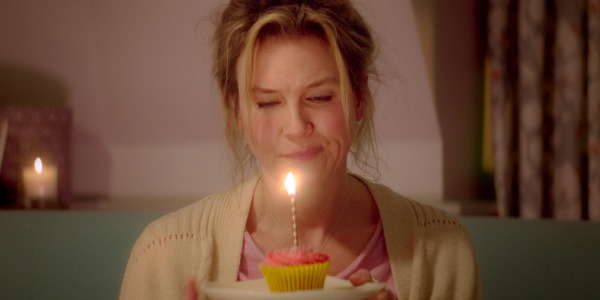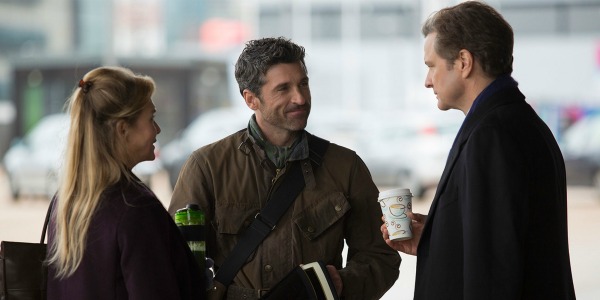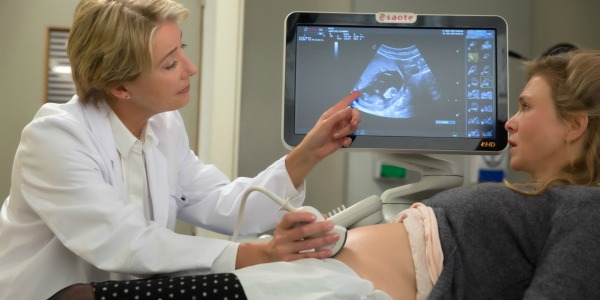BRIDGET JONES’S BABY: Infinitely Warm & Lovable

I love film, more than people probably, and I will…
I’m going to be honest with you, I loathed the first two Bridget Jones films. I read the books as a teenager and I was so excited when the first film came out only a year or two later. But I didn’t like it one bit. I thought it oversimplified Bridget, it took away all her idiosyncrasies and made her a silly, romantic type that didn’t appeal to me at all. I didn’t like the second film either. However, I still try to this day to like them both. I watch them when they’re on TV and although I never last more than half an hour or so I do try to find my Bridget in them.
I’m not sure if it was the positive reviews, the fact that this new film wasn’t directly based on a book (so I had nothing to judge it against), or because I knew that the unread copy of Bridget Jones: Mad About The Boy sitting on my floor existed in a post-Mark Darcy world, that I felt compelled to give Bridget Jones’s Baby a go. All I know is that I’m now the same age as Bridget was when the books first began, and whether I’ve finally come to understand her, or whether I just couldn’t be bothered to fight it anymore, I now love cinema’s Bridget Jones.
Looking Back In Anger
The thing is about the first two films is that they were brilliantly cast and produced but, for me, the scripts just weren’t there. The first was written by the books’ original author Helen Fielding, along with adaptation impresario Andrew Davies (known for his BBC adaptation of Pride and Prejudice) and legendary romantic comedy writer Richard Curtis. The inevitable result was that a lot of Bridget’s eccentricities and identifiers that marked her out as a ‘real woman’ got lost under Davies’s invention and Curtis’s cheesy dramatics.

The second film didn’t fare much better with Adam Brooks (writer of Practical Magic) being thrown into the trio. In hindsight it is probably this male approach to women and romance that ruined the first films for me. In Helen Fielding’s hands Bridget Jones was an awkward trier of life, in the films she became a ditzy, romcom heroine. I didn’t like that one bit. The direction wasn’t much better either, with Sharon Maguire narrowly making it through the first film (I met a cameraman who said many people wanted to walk off set) and Beeban Kidron delivering a slightly better, although more over the top Bridget in the second.
New Standards
Luckily, for me, and for us, this third film has brought all that was good about the first films (i.e. the casting) and set new, higher standards for itself. Maguire is back on board as director. She’s improved over time and possibly because of her relationship with Helen Fielding (she is the basis for the Sharon character in the Bridget Jones films) she has a better understanding of what Bridget and this film wants to say.
I was never sure about Renée Zellweger as Bridget, but she’s simply adorable in this; thoroughly lovable (maybe she always was?). Colin Firth is back as Darcy but instead of Daniel Cleaver (Hugh Grant, who is pretty much semi-retired for acting) returning as the thorn in Bridget’s romantic side we have a new affable but convincing romantic adversary in Jack (Patrick Dempsey).

Sally Phillips, Shirley Henderson and James Callis return as Bridget’s friends, along with Jim Broadbent and Gemma Jones as her parents. Unfortunately in an effort to fit in the main story, and the fact that they are no longer such a big part of Bridget’s life, they don’t get much time on screen. There are some welcome additions in Ben Willbond and Julian Rhind-Tutt, although unfortunately both are underused.
Sarah Solemani as Miranda makes a new and meaningful contribution to Bridget’s story. As Bridget’s friends are dragged from her for a variety of grown up family reasons ‘young’ Miranda is there to prompt her into having fun. She is not only the instigator of much of the film’s action but also a great comedy sidekick.
Additionally Emma Thompson turns up as Bridget’s doctor and she is superb, as per usual. Thompson also wrote the script, along with Fielding and Dan Mazer (Borat), probably around the time Fielding was writing the book version (which features a similar story). As a result Bridget Jones’s Baby was able to evolve in its own right as a screenplay and not just an adaptation of a text we (or I) were already attached to.
Older & Wiser
What makes Bridget Jones’s Baby pretty spectacular is that while it is funny, and entertaining, it also pricks at very real feelings. Bridget is now in her early forties, Darcy left her long ago and she’s feeling the pinch of not just being alone but not being a mum. What’s great about the way the writers deal with this is that while there are jokes to be had, Bridget’s story itself is above the usual angst and comedy gleaned from mentions of biological clocks and accidental pregnancies. When Bridget gets pregnant it is actually a brilliant, gorgeous thing.
Both Fielding and Thompson had babies in their forties and it was probably their understanding of what it means to be a ‘geriatric mother’ that gives this film its backbone. The story is well thought out, it’s emotional and meaningful. There are some great jokes, but they are always well-intentioned, and you can really see how Dan Mazer has added to the script without ‘steamrolling’ the female point of view. Between the three of them these writers have given Bridget Jones’s Baby real heart.

The ditsy Bridget, the overly romantic Bridget, she’s been left in the past. What we have now is a rather lovable woman who, in turn, wants someone to love. Sure, there are problems. Who is the father of her baby? Jack or Darcy? But, weirdly, that isn’t the point. This isn’t a screwball comedy, it’s a love story. It’s about Bridget loving herself and her baby, and about Darcy learning to be a better man for them both.
What makes this film something a bit special, and unusual, is Bridget’s new approach to Darcy. Still, Darcy is the romantic idol of Bridget and every Colin Firth fan from Pride and Prejudice all the way up to Kingsman, but now we really see his faults. We see how he has treated Bridget and we admire the strength she shows in caring for herself and her baby, even in the face of maybe winning Darcy back. She has a new found respect for herself and her life, and their subplot is marvellously thought out and very well written. More than anything it feels real, and not just like an idea from a romcom.
Conclusion
If you’re a thirty-something woman who, everyday, has to pay witness to the Facebook feed filled with photos of friends’ babies and articles about exactly how late in life a woman can have a healthy baby, then this film will really a strike a nerve with you. However, Bridget Jones’s Baby is a rather lovable and funny film, and I think it will give everyone a good chuckle and a nice warm feeling inside regardless of sex or age. Because this isn’t your standard romcom, this is a heartfelt attempt at something better and more real, and I love it.
What did you think about Bridget Jones’s Baby? Did you think it improved on the first two films?
Bridget Jones’s Baby is currently on global release, for more details about your country check here.
Does content like this matter to you?
Become a Member and support film journalism. Unlock access to all of Film Inquiry`s great articles. Join a community of like-minded readers who are passionate about cinema - get access to our private members Network, give back to independent filmmakers, and more.
I love film, more than people probably, and I will watch pretty much anything. Seriously, anything! I have a postgraduate education in film & have spent an exceptionally long time trying to get inside the film industry. I'm a big believer in treating every film the same, and bringing something new to the film theory table, giving reasons for every argument made. You'll find that I'm an empathetic and fun sort of reviewer, at least, I like to think so. If I'm not watching films I'm doing exceptionally nerdy stuff, like watching documentaries about the history of medicine and collecting photos of old post boxes.













